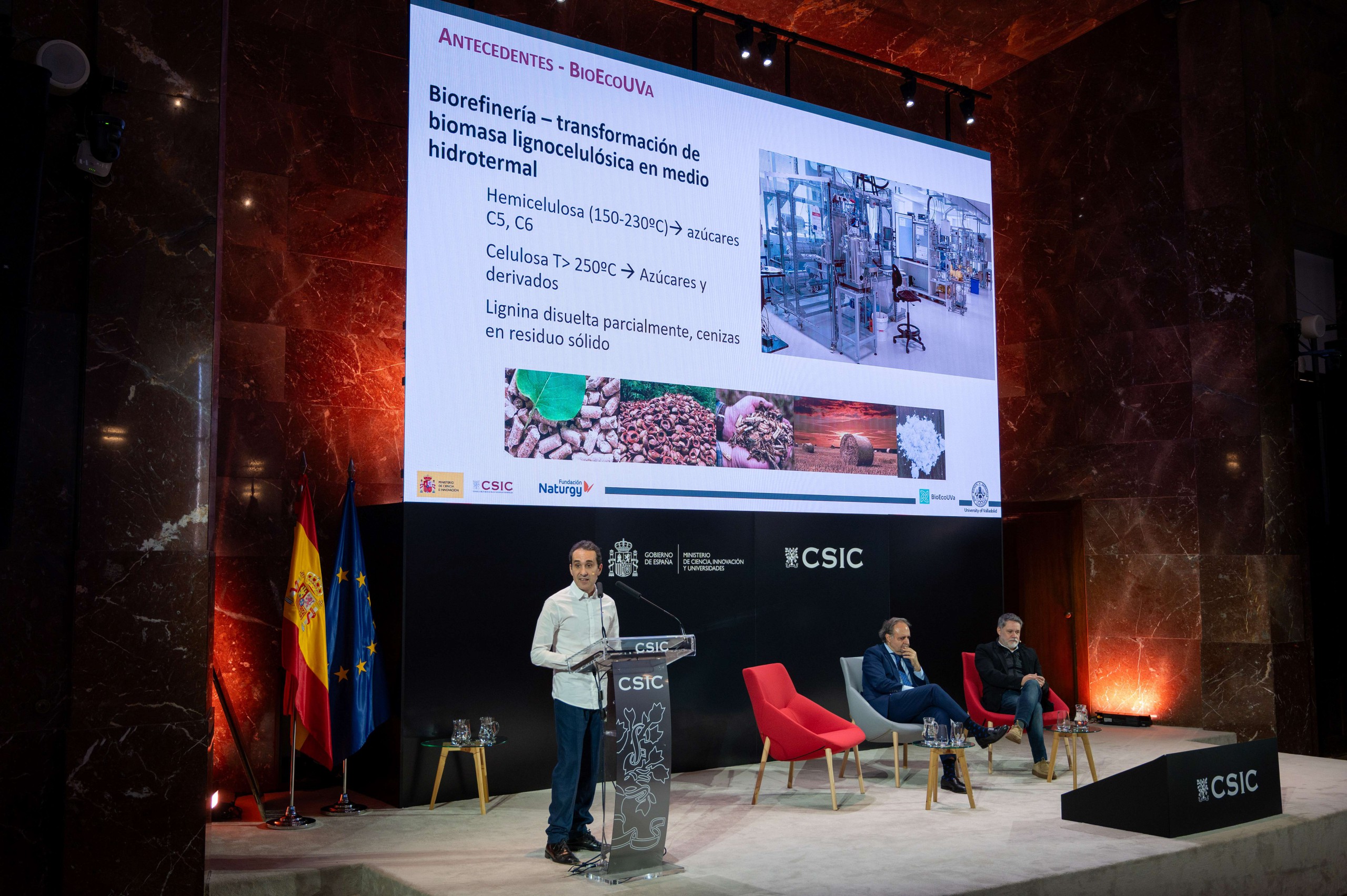The University of Valladolid Bioeconomy Institute successfully tests a project that uses biomass waste to convert CO2 into high-value chemical products
The initiative is the result of two years of research into the capture and use of CO2 by the winning project of the 1st edition of the research prize promoted by the Naturgy Foundation and CSIC.

The University of Valladolid Bioeconomy Institute, winner of the 1st edition of the Naturgy Foundation-CSIC Award for Research and Technological Innovation in the field of energy, presented today at the headquarters of the Spanish National Research Council (CSIC) the research carried out over the last two years developing the winning project “CO₂UP: Scale-up of the hydrothermal CO₂ reduction process using biomass as a reductant”, led by principal investigator Ángel Martín.
This initiative aims to develop and validate a process to transform CO₂ into high value-added chemical products, such as organic acids and alcohols, thus promoting their elimination and recovery, using plant biomass waste. Research development has been supervised and validated by a specialised scientific committee, coordinated by the Global Matter Area of CSIC.
According to its authors, the results achieved in CO₂UP represent a significant advance towards the development of sustainable CO₂ capture and recovery technologies, with a high potential for scalability and industrial application, thus contributing to the reduction of emissions and the fulfilment of decarbonisation objectives, the consolidation of a more efficient circular economy and sustainable development.
The CO₂UP project has made substantial progress in the design, construction and validation of a pilot plant, demonstrating the feasibility of the process and generating key information for its optimisation. Studies carried out have made it possible to identify and quantify the system’s main energy indicators. In particular, the stoichiometric ratio of reactants (proportions and quantities used) is identified as a key factor in achieving energy savings and improving the competitiveness of the process compared to conventional CO₂ capture and storage technologies.
The scientific and technical impact of the results achieved is evidenced by publications in leading journals and at reputed national and international conferences. From an economic and industrial perspective, a larger scale of the process with a treatment capacity of 25,000 kg of CO₂/year is envisaged for the future, which would allow its integration in installations with relevant emissions, such as the biomass boiler at the University of Valladolid.
In parallel, strategies have been developed to optimise the conversion of CO₂ into high value-added products such as formic acid, methanol and acetic acid, as well as advances in the separation and fractionation of these compounds by means of selective membranes, which has improved overall system efficiency.
The chairman of the Naturgy Foundation, Rafael Villaseca, said that, with the presentation of the results of the first edition of this initiative, “Naturgy Foundation strengthens its key role as an active agent in the promotion of research and technological innovation in the field of energy, with the aim of favouring actions aimed at accelerating the energy transition in Spain”.
CSIC chairwoman, Eloísa del Pino, highlighted the importance of the collaboration with the Naturgy Foundation, whose support has been key to the application and scaling up of this technological development. “This collaboration reinforces CSIC’s commitment to research excellence and innovation in energy sustainability, fostering the development of advanced technologies for decarbonisation and the circular economy, and promoting more efficient and sustainable energy models,” said the chairwoman of the institution.
Launch of the Energy Innovation Award
Naturgy Foundation and CSIC launched the first edition of the Award for Research and Technological Innovation in the field of energy in 2023, with the aim of recognising, promoting and encouraging energy transition projects that contribute to the fulfilment of decarbonisation objectives in our country. It is aimed at public or private, non-profit research organisations, including public and private universities and other R&D&I centres.
In its first edition, the Award received 18 eligible proposals developed by 11 universities, 5 research institutes and 2 non-profit foundations, based in 9 autonomous regions. Proposals were assessed by a scientific committee, coordinated by CSIC, and a panel of experts.
Share